- Home
- Shirley McKay
Fate and Fortune Page 5
Fate and Fortune Read online
Page 5
‘You don’t mind, if we sit here, Hew? I should keep an eye on the pot.’
‘No, indeed,’ he assured her. ‘So this is your new home? It’s grand.’
Meg smiled, a little wanly. ‘There is not much of a garden, and what we have is too close to the sea. But I have kept the physic garden up at Kenly Green. I hope you do not mind it, Hew.’
The flatness of her tone surprised him.
‘How can you think to ask it?’
‘Everything is yours now.’
‘Heartily, I wish it were not. But this is a pretty house, Meg, and the tapestries sit well here. I envy you your views.’
‘Aye, but for the wind,’ Meg answered listlessly, ‘Giles says if the castle is besieged again, then our house will be the next to fend the cannon balls, if the wind has not yet swept us down into the sea.’
Hew laughed. ‘That’s cold enough comfort! Is Giles at the university?’
Meg nodded. ‘He is with a patient. Since we came back from Kenly Green, he has scarcely been at home. He spends his hours between the college and his old turret tower that he calls his consulting room, where half the time he locks himself with patients, and the rest he sits and reads. And often he will strain his eyes to fret and squint by candlelight, and does not come to bed till dawn. And I confess … it was not what I expected.’ She dropped her eyes low, and Hew felt a growing concern.
‘He is a busy man,’ he ventured cautiously.
‘Aye, he is,’ Meg sighed. ‘And once he would discuss his business. We shared the practice, Hew, and I dispensed the remedies. He asked me for advice. Now he makes his own prescriptions, sees his patients privately and does not break their confidence. He shuts me out.’
‘Then they are private matters, that he may not talk of, even with his wife,’ suggested Hew. ‘Or else he does not want to trouble you, when you are grieving still for father’s death.’
His sister shook her head. ‘I know what it is it that preoccupies him. There is an outbreak of the virol in the town. The wives of those poor wretches that consult him come to me for help; he cannot think me blind to it. Yet he will not discuss it. The subject is too delicate, the matter is too coarse, to speak of to a wife. He has become my father, and he treats me like a child,’ she answered wretchedly.
Hew sensed something deeply amiss. He was conscious that his sister had no mother to confide in. Yet he could not talk to her about the marriage state. Decorum, and a natural reticence, together with a want of relevant experience, were strong inhibitors. ‘If you are unhappy you must talk to him,’ he urged.
Meg shook her head. ‘He will not hear it. He is careful to avoid it. And when he does not work, what little time he has,’ she went on hopelessly, ‘he has embarked upon a course of healthful exercise. He has a mind, he says, to take up golf. There upon the peg you see his golfing doublet.’
‘I see it, aye, the lozenged silk,’ Hew frowned.
‘And here set out for warming are his golfing hose and garters, and there behind the door, his golfing cap and slippers.’
‘Well …’ Hew felt at a loss. ‘Tis strange. But if he’s fixed on sport, then why not play it too?’
‘Giles says the unaccustomed air would bring on fits.’
‘And you were swayed by that? I do not think it likely. When were you likely, to take such advice?’ Hew exclaimed.
‘Of course it is not likely. Don’t you see? He does not want my company. And I am loath enough to force myself upon him.’ Meg was close to tears. ‘I sometimes think it was for pity that he married me. I am a poor enough wife.’
‘That is foolishness, Meg. You must talk to him. It vexes me to see you brought so low.’
‘It’s nothing,’ she smiled at him weakly. ‘You were right; it’s father’s death that has affected me. Giles is a good man. I should not begrudge him his play.’
‘I hope you may resolve your differences,’ Hew told her seriously, ‘for I am sad to have to leave you in this state.’
‘Are you going away?’ She looked up in alarm.
‘Aye, I must go south; but not for long. It is some business Father left. By the by, did you know he wrote a book?’
‘What sort of book?’
‘A book of his old cases. Very dull and dry. Perhaps he spoke of it to Giles?’
‘Aye, Perhaps he did.’ She had turned her attention back to the pot, as though the business held no interest after all. ‘You will find him in his tower. Go now, fetch him home. Tell him there is beef for dinner.’
Hew walked briskly past the castle to the Swallowgait, turning left at Butt’s Wynd to the college of St Salvator. On the north street, west of the chapel, stood the provost’s lodging house, where Professor Locke kept on his rooms in clear and frank refusal of the married state. Hew climbed the stairway in the turret tower, rapping lightly when he reached the top.
‘Come in, come in!’ the doctor called out briskly. ‘Pray undress behind the screen, while I make warm my hands.’
‘I pray you, do make warm your hands,’ Hew answered pleasantly, ‘though, if it please you, I shall keep on my clothes.’ He pushed open the door and went in. The room had changed little, though a few more jars and bottles had appeared upon the shelves among the rows of curios, instruments and books.
‘Hew!’ The professional glance of welcome broke into a smile. ‘Ah, forgive me, I mistook you for a patient! But perhaps you are a patient, and have reconsidered?’ Giles ventured cautiously. ‘Then you need not be ashamed. It will only take a moment now, to set your mind at rest.’
Hew flopped down on a cushion on the window ledge and groaned. ‘Peace, will you never give up? I have not come as a patient. Aye, and I will swear to you, that I will never loosen off my points to you, while I live and breathe.’
‘I take your point. You need not drive it home,’ said Giles, a little hurt. ‘Well, I am glad to see you, nonetheless. Have you been to the house?’
‘Aye,’ Hew admitted. ‘And there’s beef for dinner. But I found Meg in low spirits.’
Giles, who had brightened at the start of this remark, looked a little thoughtful at its close. ‘She is a touch melancholic,’ he acknowledged. ‘That is to be expected, since your father died. I should perhaps have noticed it. I will prescribe her something. And, if she will have it, I will take her to the surgeon to be bled. I fear I have neglected her.’
‘You may be sure she will not have it,’ Hew replied severely. ‘And you have neglected her. It is your company she wants, and not your physic.’
Giles appeared stricken. ‘What has she said?’
‘She thinks you do not care for her, since you spend so little time with her.’
‘She cannot think that! For the reverse is true.’
‘Then show it. For, in truth, it grieves me that I find her so despondent. What is the matter, Giles?’
‘You cannot doubt I love her,’ Giles retorted desperately. ‘It is this cursed sickness comes between us, Hew. I do confess, it vexes me.’
‘The falling sickness?’ echoed Hew. ‘Yet you were full willing when you wed …’
‘Ah, not that! I do not mean Meg! Peace, you must know, I do not mean Meg! You know full well, her sickness is no hindrance, save I am afraid …’ the doctor checked himself. ‘It is the wretched grandgore that distracts me.’
‘That I had noticed,’ Hew replied dryly. ‘But is it so bad?’
‘The pox runs rife throughout the town … like the very plague. In truth,’ Giles said earnestly, ‘it is worse than the plague, which terror strikes swift and kills quickly.’
‘The kirkmen say the virol targets the corrupt, and is the most discerning scourge of sin,’ Hew remarked judiciously.
Giles snorted. ‘Aye, they do, and turn their backs on countless wives and bairns. The grandgore wreaks its havoc through the generations, ravaging and maiming over many years. It is a most insidious disease, and dearly, I would like to find a cure for it. For what the surgeons presently propose …’ he shook
his head, ‘well, those are horrors dreamt in hell. You cannot conceive what the poor wretches suffer.’
‘But for a gentler remedy, might you not look to Meg?’ persisted Hew. ‘And share your apprehensions? She has wit and skill.’
‘And shall I speak to her, of foul, polluted congress?’ Giles blurted fiercely. ‘Or of suppurating pustules, on the privy member? Dear God, she is your sister, Hew! She is my wife!
‘Perhaps Meg has told you,’ he changed the subject abruptly, ‘I am embarked on a most healthful course of exercise. I recommend it to you, as most beneficial.’
‘That I infer is part of the problem,’ Hew retorted. ‘She tells me you have taken up the golf.’
‘Golf, oh aye,’ Giles said dismissively. ‘But that is a winter game, and now that it is spring, and the grass begins to grow, it is difficult to play. In truth,’ he frowned, ‘it proves a costly sort of game, for the balls are made so hard, they crack the clubs.’
‘That must be vexing,’ Hew observed.
‘It would be, if I often hit the ball,’ conceded Giles. ‘No matter, for I am resolved in giving up the gowf.’
‘Meg will be relieved.’
‘And taking up the,’ Giles went on stubbornly, ‘to which end I have set my heart upon a purchase from the senzie fair. There is a man there has for sale a pair of tennis drawers. Then you and I will take our turn upon the caichpule at the priory, for I know you played in Paris, at the jeu de paume. Shall we play racquets or hand?’
This last question startled Hew. He replied, a little nonplussed, ‘You were thinking of playing with me?’
‘Aye, and why not?’ enthused Giles. ‘You play well. And since I am a novice, you shall point out the rules.’
‘Giles … you do not think that you may find it … somewhat hot and straining?’
‘What of it? For though a chafing heat may stir the blood …’
‘I fear it might.’
‘Yet I am stout enough to brave the storm.’
‘Aye, so you are,’ Hew sighed. ‘In truth, though I should like nothing more than teaching you the catchpole, yet I am afraid that it will have to wait. I am about to leave for Edinburgh, on some business. And I may be gone a while.’
‘Ah, then that’s a pity. Still, the weather is perhaps a little chill,’ Giles conceded. ‘We shall try our racquets later in the spring. What business have you in the capital?’
‘Debts owed to my father. And another strange affair, that perhaps he mentioned to you? He has left a book of his old cases in the courts, with directions to a printer, Christian Hall.’
Giles shook his head. ‘I never heard of that. It’s strange he did not mention it. Though not so strange, perhaps, that he should leave a casebook. I have often thought that I might publish one myself. God willing, aye, a treatise on the pox,’ he added thoughtfully. ‘When I came here to take up this place, it struck me as singular, in this time and age, not to find a printer. In a university of such renown, I quite expected it. Yet it turned out our theses are sent off to Edinburgh, that has printers, but no university.’
‘Aye, it was not always so. When Nicholas and I were boys in St Leonard’s college, some six or eight years ago, there was a printer in the town, who came to grief.’
‘How so?’ Giles looked interested.
‘One of our regents, John Davidson, wrote a poem that was printed without his consent, that caused great offence to the Court. For which the printer, Robert Lekprevik, was sentenced to ward in Edinburgh castle, and remains there to this day for all I know, or else is dead.’
Giles tutted sympathetically. ‘Then what became of Davidson?’
‘That is a sad story, and one that does no credit to your college. Davidson was called before the Privy Council. He appealed to the Kirk Assembly for support, who called to witness one John Rutherford, then provost of St Salvator’s, whose office you now hold. Now this man wrote a refutation of the poem in question, that later he retracted, saying that he had no quarrel with its substance, only that he had inferred, that Davidson called him a goose. This Davidson denied, and said he had imagined it.’
‘And was he called a goose?’ Giles inquired archly.
‘There was a cleric in the poem, and he was called a goose. No names were named. But you will understand, the substance of the charge, and the Crown’s complaint, was not whether Davidson called Rutherford a goose.’
Giles chuckled. ‘Let us both be thankful we abjure such petty squabbling. The retraction, surely, was a help to Davidson. The University must have supported him?’
‘They might have done, had the Assembly had the courage to defy the Crown. But Davidson could not be sure of their support. And so he took advice, and fled to England, and we lost a good and worthy regent, and an honest man.’
‘Then I’m sorry for it. Was he your regent?’
‘Not ours, though we knew him well. In our first year as students, he was still a magistrand. And these events took place when I was gone to Paris. It was Nicholas that told me of them, in a letter. I doubt my father knew of it, for strange to say, he has a copy of Davidson’s poem in his library. Nicholas has put it in his catalogue.’
‘Your father had a keen eye for controversy,’ Giles smiled. ‘Aye, well, a cautionary tale. Let us hope that Matthew’s law book will not get you into trouble.’
‘I think it very likely,’ Hew said solemnly, ‘that this strange affair is doomed from start to end.’
‘Well, then, Christian Hall, you say?’ Giles peered at his shelves, ‘I do not know the name.’
‘The device is a crow in a tree, with an H and a cross,’ Hew replied. ‘You have not seen such on your books?’
‘Not that I recall. The corbie’s an odd enough choice,’ remarked Giles. ‘That signifies, I think, a false or tardy messenger. Or like the carrion crow, brings with it thoughts of death.’ He sang a brief snatch from the ballad, ‘The Twa Corbies’, ‘over his white banes, where we lay bare, the wind shall blow forever mair. No, there’s nothing here … Now here’s a book to interest you, returning to our theme, that has been lately Englished from the Latin, directions for the health of magistrates and students. Tis pertinent on exercise. The author says of tennis, that all parts and members of the body may be moved – save that it may be harmful to the head, which must be held aloft, like so …’ Giles stuck out his neck and pitched a phantom caich ball to the roof. ‘Tell me, Hew, is this the stance?’
‘Aye, something like,’ Hew answered doubtfully.
‘Then it will prove more wholesome than the golf, and likewise beneficial. I look forward to beginning with our lessons. Meantime, for your printer, have you thought to try the fair? There are bookstalls there a plenty. Tis likely they have heard of him. In fact,’ he nodded, ‘since there is no time like the present, let us go together; you shall help to strike my bargain for the tennis things.’ He set down the book, and pleased with this plan, began to button up his coat.
‘Fair enough,’ Hew grinned. ‘Shall we take Meg?’
Giles frowned at him. ‘The fair is most busy and noisome. It could do her no good. But we shall bring her gingerbreads, or ribbons for her hair.’
‘If you treat her like a child,’ objected Hew, ‘it is not like to please her.’
‘As her man of physic, I could not assuage my conscience, if I had encouraged her to walk among the thrang. It would precipitate a fit, you may be sure of it. Aye, you’re right, no gingerbers. The fair is a source of concern, I confess,’ Giles reflected seriously. ‘So much of this prevailing sickness comes from overseas. A thousand foreign sailors and their whores compound our present fears.’
‘You see demons everywhere!’ Hew protested, as they stepped into the clamour of the street. Stalls had spilled out from the cloisters of the priory to line the three main thoroughfares; in the marketplace, they jostled with the usual buiths where hawkers cried their wares. The odours hung heady and cloying. They fought their way through to the cathedral, where foreign merchants had set
out their wares, silverware and silks more precious than the petty toys and trinkets in the street. The town pipes and drum that had called in the fair were sitting idle on the grass, and the piper himself in yellow and red leant against the far wall eyeing up the lassies, biding the time he was called for a tune. A troupe of tumblers staged their act upon the centre of the green, and Giles relaxed a little as he paused to watch. Playfully, Hew tugged his sleeve.
‘Don’t think on it! For you have not the build!’
‘Think you not? Tis pity,’ Giles allowed a smile. ‘Ah, well, never mind!’
A Game of Tricks
Beneath the cloistered penthouse, sheltered from the wind, they found stalls selling sheets of French paper, folded into quires, as well as books and pamphlets and an assortment of penners, inkhorns and inks. ‘A table-book, gentlemen?’ the stationer called out.
‘Perhaps,’ Hew murmured absently. He declined the proffered notebook, and picked up a small volume, bound in brown calf. ‘Buchanan’s Baptistes,’ he said aside to Giles. ‘Nicholas will like this. Have you De iure regni?’ he inquired of the bookseller.
‘Have a care,’ cautioned Giles, ‘the book is frowned upon.’
‘Not yet proscribed, I think,’ Hew whispered. ‘Dearly, I should like a copy for my library.’
The bookseller made a show of examining his stock. ‘I doubt I sold that one this morning. Here are Buchanan’s Psalms, that always proves most popular.’
Hew shook his head. ‘It was the laws of kingship I required.’
‘Aye. Well then,’ the man conceded defeat, ‘I doubt it can be had from Henry Charteris, his buith upon the north side of the high street, just above the tron. All these books are his.’
‘Are you from Edinburgh, then?’
‘I am, sir. Here’s a Latin grammar, Roodiementya …’
‘No grammars please,’ Hew told him firmly. ‘Tell me, do you know a printer by the name of Christian Hall?’

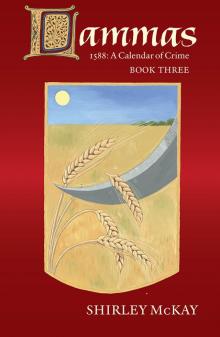 Lammas
Lammas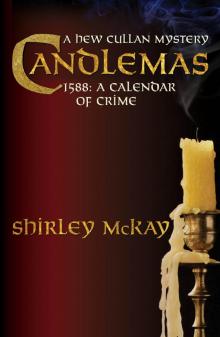 Candlemas
Candlemas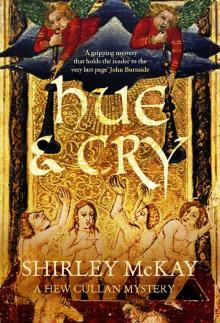 Hue and Cry
Hue and Cry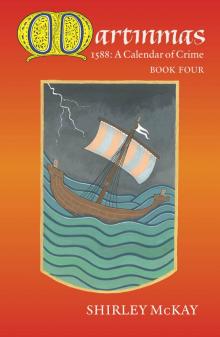 Martinmas
Martinmas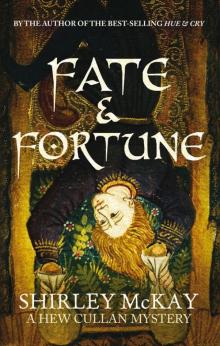 Fate and Fortune
Fate and Fortune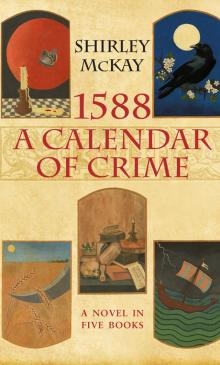 1588 A Calendar of Crime
1588 A Calendar of Crime Time and Tide
Time and Tide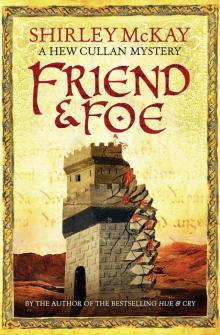 Friend & Foe
Friend & Foe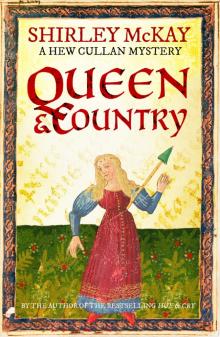 Queen & Country
Queen & Country